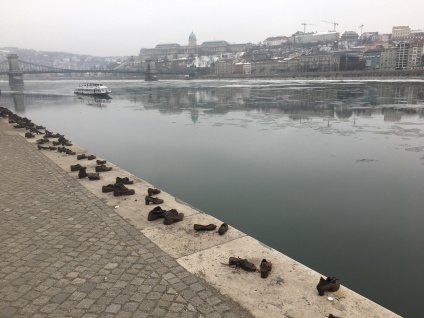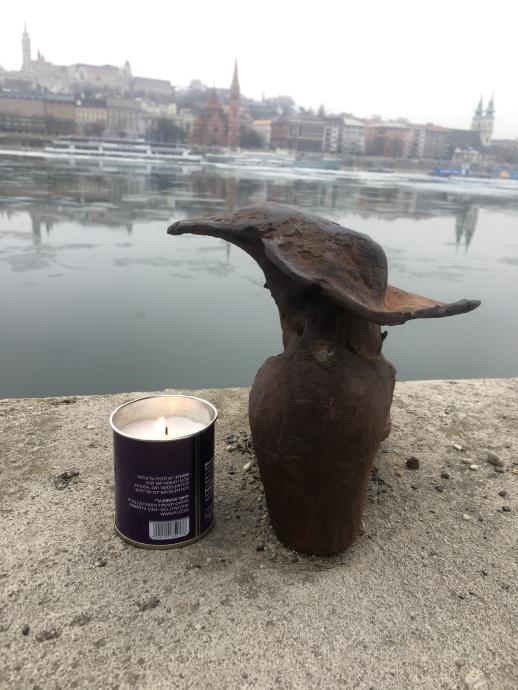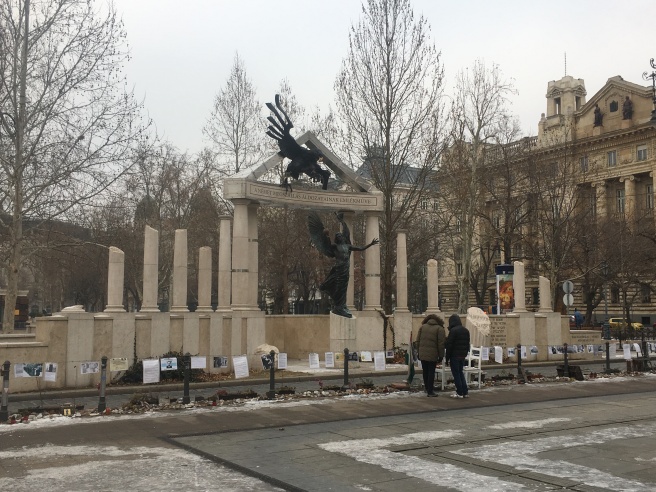
Our final day of the trip took place on Shabbat. We had time to relax on our own in the morning and in the afternoon, we took a walk along the Danube River to visit the ‘Shoe Memorial’, a memorial dedicated to the 3,500 Budapest Jews who were shot and thrown into the river during the Holocaust. The memorial is a long stretch of shoe sculptures, very realistic, and also very troubling. They sit on the edge of the river and its power is clear by the fact that almost every shoe, and scattered across the memorial, you find small memorial candles that have burned in commemoration of this sickening and twisted Nazi strategy to rid the city of Jews.

A troubling event occurred while we were there. We joined together in Mourner’s Kaddish and as we sang ‘Am Israel Chai’, a song about the power of our people to survive any hardship, a foreign tourist, wearing a hiking backpack, walked by our group and gave us the ‘heil hitler’ salute. As soon as he passed our group, he ran off, as we sang the song even louder, but we were all in shock and remained that way for awhile. Here we were, honoring the victims of the past and at the same time, being reminded that forces that led to Hitler’s reign are still alive and well today. Sickening and disturbing to say the least. According to our tour guide, the person was most likely a European tourist, given how he was dressed and the fact that he had a hiking backpack, so he probably wasn’t a local, but it doesn’t really matter whether the antisemitism is home-grown in Hungary or not. The fact remains that this part of the world (and increasingly in other parts of the world), will continue to fight antisemitism for a long time. We’ll never really escape it and our moment at the shoe memorial was a bitter reminder of that.

On the other hand, later in the evening, back at our hotel (which, by the way, was incredible – the Intercontinental Budapest sits on the river and has views of the Danube that are unrivaled), we had a visit from three Budapest Jews who told us that Hungarian Jewry is alive and well. In fact, it’s thriving, according to them. They represented a Reform synagogue, a Neolog community (a specifically Hungarian-type of synagogue that blends Modern Orthodox elements in the prayer service experience with liberal and almost secular Jewish practices outside the synagogue walls), and a representative from the Jewish Agency who works with young Hungarian Jews in a many settings.
Here’s what I walked away with from that discussion:
- We must stop relegating Central European Jewry to the annals of history, assuming that the Holocaust destroyed any semblance of Jewish life in these countries today. In both Vienna and Budapest, it’s clear that there are Jews who are creating meaningful Jewish experiences for themselves and I working very hard to understanding how Judaism can fit into their lives. For Hungarian Jews, many are just discovering they are Jewish for the first time, sometimes in very random ways. Because of Communism, there was no practice of religion in public and many Jews hid their identities from even their own family members. Only recently have Jews come to learn that they have Jewish roots and they have no idea what to do with that information. That’s where the vibrant Jewish community (with more than 20 synagogues in Budapest alone!) is stepping in to provides opportunities for Jews to study about their own tradition and meet other Jews. One of the speakers told us a powerful story about her own experience going to Israel to study. When she got there, older people in Israel would say to her, “You’re too young to be speaking Hungarian.” In other words, they’re only understanding of why someone would speak that language is because they survived the Holocaust. She had others say to her, “How can you speak that language knowing what the Hungarians did to our people?” Of course, these statements hurt her and she actually decided to return to Hungary and build a vibrant Jewish community at home. In her words, “I would rather be a Jew in Hungary than a Hungarian in Israel.” It was harder for her to find her Judaism in Israel than it was for her to find it in Budapest, where her Jewish identity seemed to blend into the fabric of her life much easier than when she was in Israel, struggling against a tide of skepticism and misconceptions about today’s Hungarian Jews. We need to understand that Judaism is thriving in Hungary and we must support its growth. And according to these Jewish leaders who spoke with us, the support doesn’t need to come in the form of trying to help them build Jewish institutions in the country or help them financially. They are happy to be doing what they’re doing in their own way. They just want us to recognize their existence, their value, and honor their own approach to building Jewish life in this country.
- Hungarian and American Jews are actually searching for the same thing. Both of our communities are asking what it means to be Jewish today and what does it mean to be affiliated with a Jewish community. And in some ways, the Hungarian Jewish leaders are doing some innovative things that we could learn from for our own communities back in the US. Since most Hungarian Jews were raised completely secular and come from a society in which religious ritual wasn’t allowed in public, their focus is really on community-building and basic education. The majority of young Hungarian Jews just want to belong to something because it turns out that communism stripped the whole country of opportunities for people to feel a part of something special and unique -0 everyone just had to fit in to the same model. That’s why today there are so few organizations in the country that support sub-groups, whether that by LGBTQ families, various religious groups, even just interest areas. The Jewish community is one of the few places where young Hungarians can feel a part of something and many non-Jews are joining in their services and activities for that reason. The organized Jewish community in America should study the Hungarian Jewish community for elements and strategies that can help us reach out to unaffiliated Jews in our own communities. Despite the different historical contexts of our two communities, we are both looking for ways to connect people to one another, add meaning to their lives, and foster a love and appreciation for what our tradition has to offer.
Final Thoughts on the Trip
This was a whirlwind five days of travel around Vienna and Budapest, two cities for which I held many assumptions before visiting them. The doom and gloom perspective of these cities and their Jewish communities is so false and the trip has reminded me of just how important it is to combat sweeping generalizations. Most importantly, my eyes have been opened to the historical and physical beauty of two incredible cities with rich Jewish roots and thriving communities. Da’at Travel, our tour guides, did a fabulous job (as they always do) of creating an experience that was educational, experiential, meaningful, and timely.
I’m going home to a country that is facing its own challenges right now. For a people who have always been refugees and for whose tradition commands us to welcome the stranger, I’m disturbed by our new president’s attempts to squelch an important point of pride for Americans – we have been a refuge and safe haven when other countries have not. Experiencing Vienna and Budapest has given me an even greater appreciation for the democratic system we have built in America. As citizens, and as Jews, we cannot allow certain leaders or groups of people take away one of our greatest points of pride in this world. Learning about the Hungarian government and their leader’s move towards more and more dictatorial strategies of rule, I cannot help but reflect on our own political climate in the US. And like the Jews of Vienna and Budapest, I am hopeful that we can rely on our values and our history to ensure we build a future that embraces diversity, cultural heritage, and partnership.
I’m grateful to the Temple Isaiah community for allowing me to participate in this trip and I hope I can come back to these cities with members of our community at some point in the future.
There was a hell of a welcome party awaiting me in Los Angeles! I arrived at the Los Angeles airport at the same time as a massive protest (thousands of people) was taking place against Trump’s executive order banning refugees and visitors from seven predominantly Muslim countries. My family joined me at the protest outside the International Terminal and it was a fitting end to a trip during which I had been exposed to the historical repercussions of fear and hatred of the ‘other’.






Hi rabbi! 😁
We went to Budapest 4 or 5 years ago and it was quite depressing. I read your comments about the strength of the community, which is great. My question is are they fearful the government will become more totalitarian and anti-Semitic? When we were there, there were definitely outright signs of anti-semitism and neo-nazism by Hungarians.
LikeLike
There is definitely some concern about the current government and the potential for problems down the road. We had a whole session with someone from a think tank who gave us the low-down on the scary turn the government is taking away from democracy (I just didn’t have time to write about it, though I may put my notes online soon). The leader of Hungary is good friends with Putin (he is visiting Budapest in the coming week or two) and there seem to be some similar strategies being implemented in Hungary that mirror Putin’s leadership style in Russia. So, yes, there is some concern, but more about the country in general and less specifically about a significant rise in antisemitism.
LikeLike
Joel. It was great having you along. It’s always a pleasure when we get time to connect. I appreciate your thoughtful comments!
Ps. Thanks for leading the final session.
LikeLike